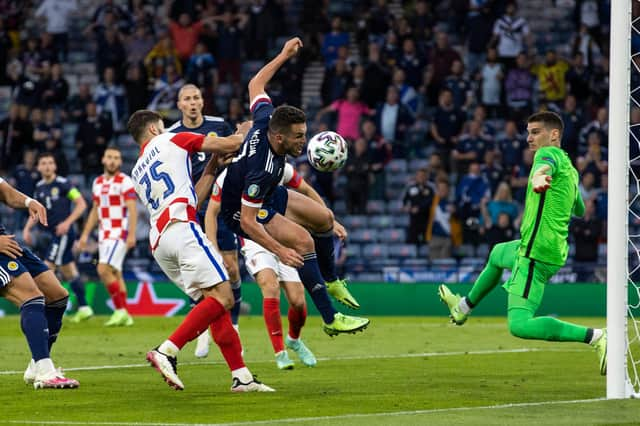Euro 2020: No Billy Gilmour, no last-16 tie ... Scotland's tread of failure goes on after night of familiar woe against Croatia


In a hotel room in County Durham, a young midfielder switched off his remote, turned over on his bed and tried to get some sleep after briefly considering trashing his room. The dream is over.
There will be many magical occasions ahead for Billy Gilmour, just not in this tournament. Another diminutive midfielder 15 years his senior saw to that. Luka Modric proved inspirational. He wrote his name all over this do-or-die game. Turns out Group D stands for despair, as we always feared it would.
Advertisement
Hide AdAdvertisement
Hide AdThere was no tonic under the Hampden lights for the shorter days we must now endure.
A familiar tale of heartbreak unfolded in front of our eyes. In truth, Croatia proved a cut above. Their red-and-white tablecloth shirts proved an undeniable stamp of quality, as much as we tried to kid ourselves that they are on the wane and Modric, this little genius, was past his best.
Scotland must re-engage with the ambition of qualifying for the second stage of a major tournament at some point in the future. The first task is simply getting to a major finals again. And who knows when that might be?
The tread of failure – sometimes glorious, sometimes miserable – extends back to 1954. As much as we hoped it might be otherwise, Scotland seem trapped in the same old movie.
Steve Clarke’s side were not good enough in the final analysis but there was some familiar misfortune, particularly when Grant Hanley, one of Scotland’s best performers in the tournament, was forced out of the game due to injury before half-time.
There had been some reason to believe that somehow, this time, it might be different, but two second-half goals, one scored by a Real Madrid player and the other by one from Inter Milan, proved a bridge too far for the Scots, who at least exit the tournament with a goal to their name. Callum McGregor’s fine strike four minutes before half-time means Craig Burley no longer holds the status of last male Scotland player to score in a major finals. Small mercies, and all that. But the itch of never making the second stage refuses to be scratched.
It has been a while since Scotland have had their destiny in their own hands at the last group game – Italia ‘90, when they were up against Brazil. They’ve never been blessed with playing a deciding game at Hampden, although Scotland were officially the away team here and had the novel experience of getting changed in the away dressing room rather than the home one.
Sadly, a Scotland No 23 jersey was not hanging in either of them. The ghost of Billy Gilmour was hard to shake. Stephen O’Donnell was also missing. Or at least the Stephen O’Donnell from Wembley. The right wingback endured a torrid time of it, in the first-half in particular. Stuart Armstrong, meanwhile, replaced Gilmour. It was not a success.
Advertisement
Hide AdAdvertisement
Hide AdMcGregor operated as the conduit between defence and attack. It was a tough shift at first without this little pal beside him. McGregor tried manfully but there was a lack of composure from Scotland in midfield.
‘Billy would have managed that, Billy would have seen that, Billy would have taken the ball in that tight area, and then found a man’. It was possible to read the mind of nearly every Tartan Army member.
And yet, McGregor turned into something of a saviour here, trying his best to make up for Gilmour’s absence while providing some much-needed support for his friends further forward. What a time to score a first goal. McGregor has been one of Scotland’s successes in this tournament despite failing to make the starting line-up for the opening day defeat to Czech Republic. He drilled a drive into the bottom corner to put his side back in the qualifying equation. It briefly got Scotland back in the mood.
Saltires were hanging from the windows of tenement flats. They fluttered in the sun. There was a carnival atmosphere outside the ground even given the restricted numbers.
Split into two teams of five outfield players at warm-up, it struck you just how much was expected from so few. This elite band of mates had so much hope invested in them that, if they stopped to think about it, they would struggle to negotiate the walk back out from the dressing room. The 12,000 or so fans inside the stadium gave it everything they had to make it sound as if these were in fact normal times, and the stadium was full.
No matter how many people are present in a stadium, silence is silence. The decibel level dropped the moment Nikola Vlasic struck after 17 minutes. Ivan Perisic rose imperiously above O’Donnell to nod Josip Juranovic’s cross into Vlasic’s path. The forward took a touch and swept a shot beyond David Marshall.
In truth, anxiety had been palpable in the few minutes leading up to the opener as Croatia began to exert control. Unsurprisingly, it was Modric pulling the strings. Scotland just did not have an answer to his promptings and were being pulled all over the place.
For a while, it was verging on embarrassing. Fans sounded offended: what was this tripe after the highs of Wembley?
Advertisement
Hide AdAdvertisement
Hide AdSomehow Scotland hung on. Marshall put the memory of being beaten by Patrik Schick’s 50-yard strike firmly behind him. He raced out of his goal to deny Vlasic and, in the second half, saved bravely at the feet of Josko Gavardiol. But that was the problem; Scotland always seemed to be hanging on.
There was little of the control of Wembley, there was little of the artistry. There was no… well, you know who.